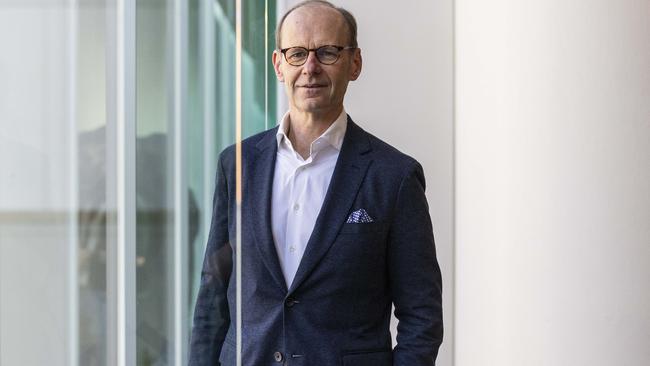ANZ boss warns banks becoming preserve ‘of the rich’
ANZ boss Shayne Elliott warns banking could become the preserve of the wealthy with an entire generation frozen out of obtaining home loans and other forms of credit.

ANZ boss Shayne Elliott warns banking could become the preserve of the wealthy as tighter lending regulations and compliance risked freezing an entire generation out of obtaining home loans and other forms of credit.
The chief executive of Australia’s fourth-biggest bank said in Brisbane on Tuesday that the desire to create “safe banks” where lending controls ensured no-one failed risked creating a less equitable society. “I worry we have created a system where banking or access to credit is just for rich people,” Mr Elliott said at the QUT Business Leaders’ Forum.
“If you can’t get a home loan, or can’t start your business, because the laws makes it really hard for banks to lend to you, that means the economy is less dynamic.”
He said he understood lending had to be tightened up after the GFC and the Royal Commission into banking but worried “that we’ve got the settings wrong.”
He said the burden of compliance had to be passed onto customers and shareholders, noting that over the past six years the cost of new regulations had increased more than four-fold. “When I took over as CEO in 2017, for every dollar of revenue that ANZ made, we had to invest 0.7 cents to cover the cost of new regulations. New things would come along - we would have to build some new system or hire some people to do whatever. Last year, that was 4.7 cents so it has just kept going up.”
He said that regulatory burden was an increasing drag on the community, “making it harder to get a loan, credit card and start a business.” “It’s a bit like wanting to eliminate traffic accidents so we are going to impose a 5 kilometre per hour speed limit,” Mr Elliott said. “Well we would be safe, that’s true, but nothing would work.”
He pointed to costs to introduce open banking regulations as one area of concern. Australia’s open banking regime, aims to drive innovation and competition, as well as give customers more control over their data and easier access to products and services.
“The industry had been told that compliance with the open banking regulation should cost the industry somewhere between $80m and $100m. To date that figure is $1bn and it is still going,” Mr Elliott said.
He added the great Australian dream of home ownership was becoming out of reach of the younger generation, noting that people with mortgages were surviving despite cost of living pressures. “The people who are doing it tough are the people who are renting,” said Mr Elliott. “They haven’t had the same sort of pay increases so cost of living is impacting them far greater than it is anybody else because they pretty much spend every dollar they earn.

“Is it the end of the great Australian dream in terms of the homeownership? We hope not.
The government needs to do some serious thinking about that because if you destroy that, if aspiration has gone, that’s got very serious implications for the economy.”
He said governments needed to increase housing supply by making planning and development costs lower. “It just a reality today that the average Australian can’t afford the average Australian home,” he said. “And so that starts to have real implications for the way young people think about their role in society. There’s a lot of social cohesion that comes from home ownership and it certainly provides a wealth buffer for when people are older. But again I worry there’s a growing part of the population that sees that as unachievable.”
There also had to be a discussion about the coming generational wealth transfer from the Baby Boomers to their children that risked creating further inequities. The introduction of estate, or death duties, in some form to balance that should be considered.
“There will be certain people inheriting and some people that don’t,” he said. “Sadly, that can embed a class system because the people whose parents have homes, they’re the ones who’ve had mum and dad who have been able to help them get a deposit. And they’re the ones who are going to inherit so it actually perpetuates that class system.”
He said a “modest” estate tax could be considered as part of tax reform, “It’s like most things when they go to extremes they can be really destructive,” Mr Elliott said. “But some modest proposal, like a capital gains tax, kind of make sense. You just don’t want it to be extreme.”
Turning to ANZ’s stalled $4.9bn bid for Suncorp Bank, Mr Elliott said he was still confident the deal could get over the line with an appeal to the Australian Competition Tribunal. The deal was rejected by the ACCC earlier this month on competition grounds. “It wasn’t a surprise, but we held out hope,” said Mr Elliott. “We prepared our board and we obviously disagree (with the ACCC) and we think they’re wrong. We think this actually in the interests of consumers and in the interest of competition.”



